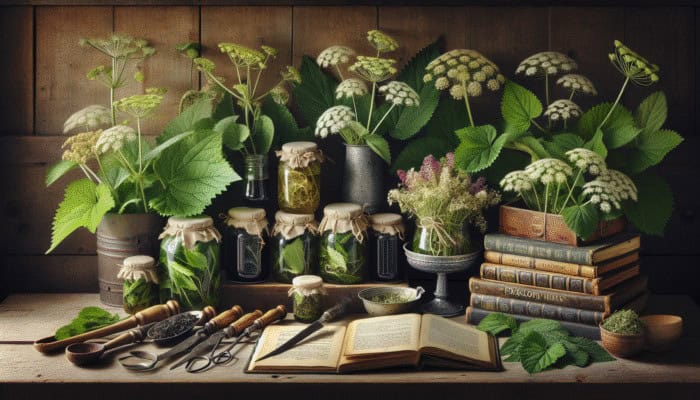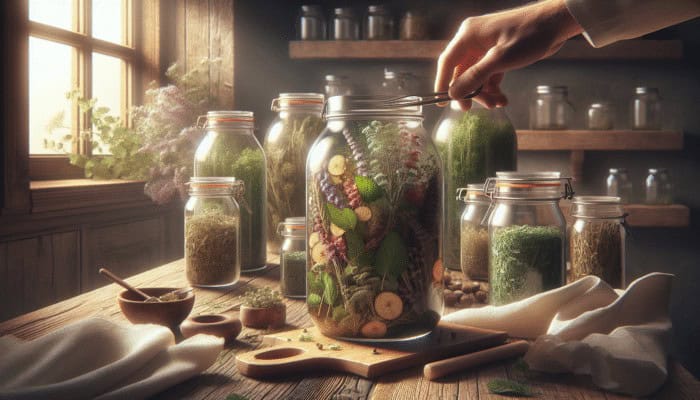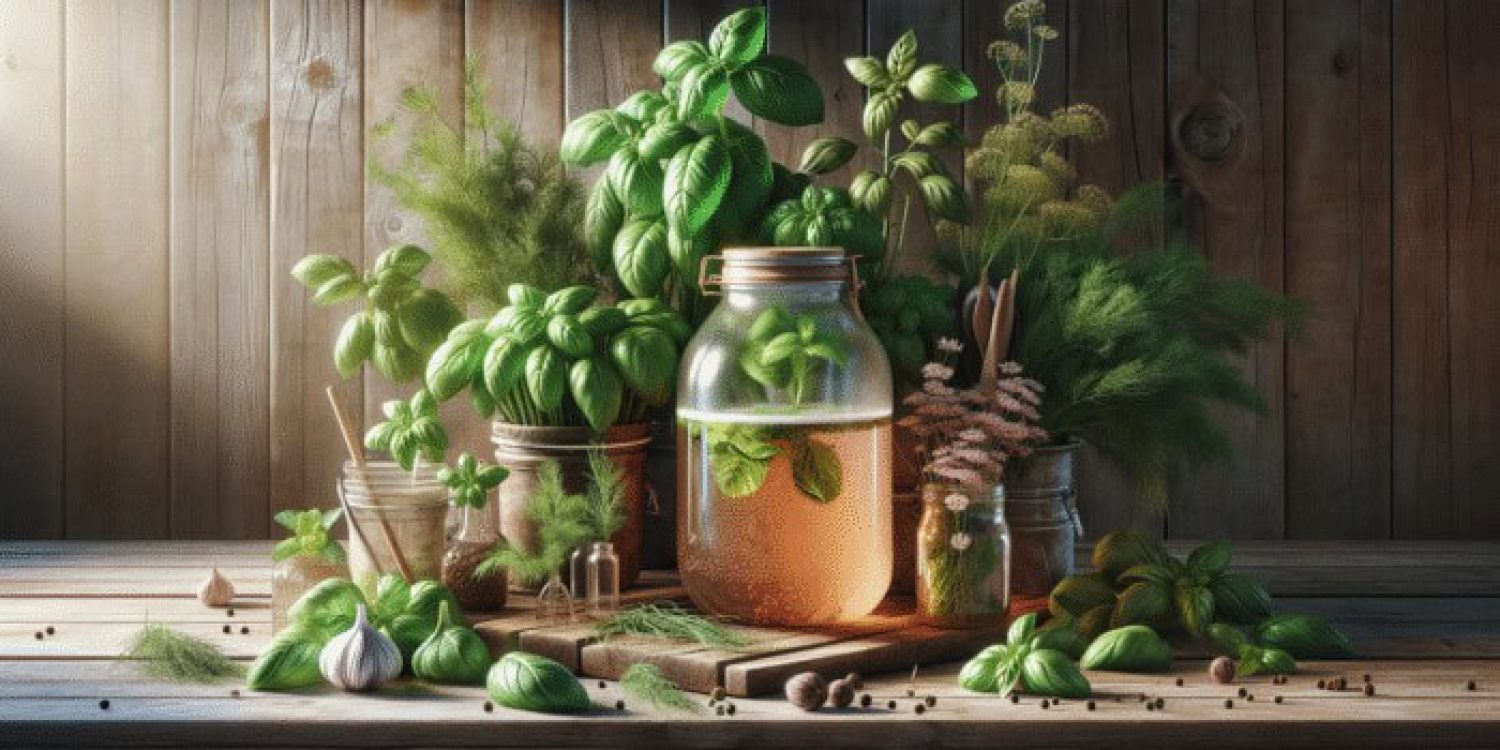Mastering the Selection of Herbs for Effective Fermentation
Choosing Authentic UK Herbs for Fermentation

The United Kingdom is steeped in a rich history of utilising herbs for both culinary and medicinal purposes. When delving into the art of fermenting herbs to amplify their potency, it is crucial to concentrate on varieties that are not only potent but also deeply embedded in UK folklore. Two exemplary choices are nettle and elderflower. Often dismissed as a mere weed, nettle is surprisingly abundant in vital nutrients such as vitamins A and C, iron, and calcium. Its robust nutritional profile makes it an exceptional candidate for fermentation, enhancing its health benefits significantly. Likewise, elderflower has a long-standing association with British culture, commonly found in cordials and syrups that celebrate its delightful floral aroma and flavour. Fermenting these herbs can further elevate their natural properties, allowing individuals to harness their full potential effectively.
When embarking on the journey of selecting traditional UK herbs, it is essential to evaluate both their unique flavour profiles and their associated health benefits. For example, thyme is another herb that flourishes in the UK’s temperate climate and is renowned for its antiseptic properties. Its aromatic essence can transform into a delightful infusion through fermentation, making it perfect for a variety of culinary applications. Additionally, herbs such as mint and rosemary are not only fragrant but also possess distinctive medicinal properties, aiding in digestion and respiratory health. A carefully executed fermentation process can dramatically enhance these attributes, resulting in a versatile addition to your culinary repertoire and pantry.
Finding Premium Quality Herbs in the UK
Acquiring fresh, organic herbs is a fundamental step in the fermentation journey. The UK is home to a plethora of local markets and specialised herbal shops where you can discover high-quality herbs. Farmers’ markets are particularly invaluable; they often showcase local growers who prioritise sustainable farming practices. These markets not only offer a diverse array of herbs but also facilitate connections with the growers, allowing you to gain insight into their cultivation methods and practices.
In recent years, online shops have surged in popularity, providing a convenient selection of organic herbs delivered directly to your doorstep. When selecting suppliers, ensure they offer transparent information regarding their sourcing methods, guaranteeing that you receive the finest quality available. Additionally, cultivating herbs from local gardens can prove to be a fulfilling experience, as it enables you to grow your own herbs and choose the most potent specimens for fermentation. Keep in mind, the fresher the herbs, the superior the final product will ultimately be.
Deciphering Herb Potency for Optimal Fermentation
Evaluating the potency of herbs is a critical aspect, especially within the context of the UK’s unique climate and growing conditions. Factors such as temperature, soil quality, and sunlight exposure play pivotal roles in determining the potency of various herbs. For instance, herbs like basil thrive in warmer, sunny locations, while others, such as mint, prefer cooler environments. Understanding these growth conditions will empower you to select the most suitable herbs for fermentation.
In the UK, unpredictable weather patterns can occasionally impact the potency of your herbs. Regularly monitoring the health of your plants will enable you to identify the most vibrant and nutrient-rich specimens for fermentation. Additionally, harvesting at the optimal time—ideally just before flowering—can ensure you capture the peak potency of the herbs. Engaging with local gardening communities or seasoned herbalists can provide valuable insights into which herbs are currently thriving and their corresponding potency levels.
Effective Preparation Techniques for Herbs Prior to Fermentation

Thorough Cleaning and Chopping Techniques for Best Results
Preparing herbs for fermentation is a meticulous endeavour that necessitates a focus on cleanliness and optimal cutting size to ensure effective fermentation. Begin by thoroughly washing the herbs to eliminate any dirt, pesticides, or potential contaminants. This initial step is essential to prevent unwanted bacteria from interfering with the fermentation process. Using cool, clean water, gently rinse the herbs and lay them out on a clean towel or drying rack, allowing excess moisture to evaporate naturally.
Once the herbs are clean, the next crucial step involves chopping them. This process should be undertaken with care; the size of the chopped herbs can significantly influence the overall fermentation outcome. Smaller pieces expose more surface area, promoting a faster fermentation process. However, be cautious not to over-chop, as this can result in a mushy texture. Aim for a balance that maintains some structural integrity while enhancing the fermentation potential. Utilising sharp knives or kitchen shears can help avoid bruising, which may negatively impact the flavour profile.
Choosing the Right UK-Specific Fermentation Vessels
Selecting the appropriate fermentation vessel is vital for ensuring a successful fermentation experience. Traditional UK fermentation vessels, such as ceramic crocks or glass jars, are widely utilised for herb fermentation due to their ability to maintain stable environments, which are essential for creating the right conditions for fermentation to occur effectively.
When selecting a vessel, consider its size; it should adequately accommodate your herbs while allowing adequate space for air circulation. Glass jars with wide mouths are particularly advantageous, as they allow for easy monitoring of the fermentation process. This transparency enables you to assess the herbs and gauge the progress without disrupting the fermentation conditions. Furthermore, employing a fermentation weight can help keep the herbs submerged, promoting even fermentation and preventing the growth of mould during the process.
Understanding Timing and Seasonal Influences on Fermentation

Timing is a crucial element in the fermentation of herbs, especially in the UK, where seasonal variations can significantly impact both the potency and availability of various herbs. The optimal period for fermenting herbs is typically during the late spring and summer months when herbs are in full bloom and at their peak potency. During this time, you will discover herbs such as basil, dill, and coriander at their most flavourful and nutrient-dense state.
As seasons shift, some herbs may become less viable for fermentation, while others, like sage and thyme, may flourish during the cooler months. Understanding the seasonal availability of herbs allows you to effectively plan your fermentation projects, ensuring the use of the freshest and most potent ingredients. Keeping a seasonal calendar can be a useful tool for tracking which herbs are at their peak potency, ultimately enhancing the overall quality and efficacy of your fermented products.
Choosing the Most Suitable Herbs for Fermentation
Not all herbs lend themselves well to fermentation, and selecting the right ones can significantly influence the flavour and health benefits of the resulting products. In the UK, herbs such as garlic, ginger, and chillies provide a unique depth of flavour when fermented. These herbs not only introduce a zesty kick to various dishes but also offer a multitude of health benefits, including antimicrobial properties and support for digestive health.
When contemplating flavour profiles, consider how the herbs will complement one another as well as the dishes in which they will be utilised. Combining herbs like rosemary and thyme can create a robust flavour base perfect for marinades, while mint and basil can add a refreshing twist to salads and sauces. Always keep in mind the balance of flavours and the intended use of the fermented herbs. Experimentation is key; those who are willing to explore different combinations may discover exceptional flavours that elevate their culinary creations to the next level.
Comprehending the Fermentation Process for Herbs
Establishing the Ideal Fermentation Environment
Creating the optimal fermentation environment is paramount for successfully fermenting herbs. A temperature range of 18-24°C is generally regarded as ideal for most herb fermentation processes. In the UK, especially during the summer months, maintaining this temperature can be relatively straightforward. However, during the colder seasons, you may need to identify a warm spot in your home, such as near a radiator or in a cupboard that receives some warmth to ensure adequate fermentation conditions.
Humidity plays a significant role in fermentation as well. While a moist environment is necessary to encourage fermentation, excessive humidity can lead to spoilage. To monitor humidity levels in your fermentation space, consider using a simple hygrometer. Adequate ventilation is also essential to prevent the accumulation of carbon dioxide. If you are using a covered vessel, ensure it features an airlock or is loosely covered to allow gases to escape while preventing contaminants from entering the fermentation medium.
Evaluating the Progress of Fermentation
Monitoring the fermentation progress of your herbs is vital for ensuring they achieve peak potency. Regularly checking the herbs will help you assess their texture, aroma, and flavour, allowing you to ascertain when they are ready for use. Taste-testing is one of the most effective methods for monitoring progress; as the flavours evolve, you will discern a distinct transformation that indicates readiness.
The fermentation duration can vary significantly based on numerous factors, including the type of herbs, temperature, and the specific fermentation method employed. Some herbs may require only a few days to ferment, while others could take weeks to reach the desired potency. Keeping a fermentation journal can be immensely valuable; documenting your observations, including dates, temperatures, and flavour notes will serve as a useful reference for future fermentation projects.
Troubleshooting Common Fermentation Issues
Fermentation is as much an art as it is a science, and encountering issues is not uncommon. In the UK, fluctuations in temperature can pose significant challenges. If the fermentation environment becomes too cold, it may slow down the process, while excessive heat can result in spoilage. Investing in a thermometer can help you maintain a consistent temperature throughout the fermentation process.
Mould is another frequent issue; it typically arises if the herbs are not fully submerged in the fermentation liquid. To mitigate this, ensure that your herbs are adequately weighted down. If mould does appear, it is crucial to remove it promptly to avoid spoilage. Should you notice any unpleasant odours or off-colours, it may be best to discard the batch and start anew. Learning to identify the signs of successful fermentation will enhance your skills over time and lead to more consistent results.
Further Considerations for Selecting Herbs for Fermentation
Building on previous discussions about suitable herbs for fermentation, it is essential to consider local availability and seasonal variations specific to the UK. Not every herb will flourish simultaneously throughout the year, and sourcing herbs from local farmers or markets can greatly enhance both quality and flavour.
For instance, during late summer, herbs such as dill and coriander may be abundant. As the seasons transition into autumn, consider herbs like sage and thyme, which exhibit greater resilience to cooler temperatures. Understanding local growing seasons will not only assist you in choosing the best herbs but also promote sustainability by minimising the carbon footprint associated with transporting herbs from distant locations.
Harvesting and Preparing Herbs for the Fermentation Process
Harvesting herbs at the optimal moment is fundamental to ensuring successful fermentation. Ideally, herbs should be gathered just before they flower, as this is the point at which their essential oils and nutrients are at their peak. For example, herbs such as basil and mint should be harvested early in the morning when their oil content is highest, maximising their flavour and potency.
Once collected, preparing these herbs involves more than mere cleaning and chopping. Consider the fermentation method you plan to utilise; whole leaves may work better for a salt-brine fermentation, while chopped herbs may be more suited for a vinegar-based fermentation. Regardless of the method chosen, ensure that the herbs are as fresh as possible to enhance the flavour and potency of the final product.
Enhancing the Potency of Herbs Through Fermentation
Incorporating UK-Specific Ingredients to Boost Fermentation
Integrating UK-specific ingredients can significantly elevate the potency of your fermented herbs. For example, incorporating local honey not only adds natural sweetness but also boasts its own health benefits, including antibacterial properties. The natural sugars present in honey can further assist in the fermentation process by providing additional nourishment for the microbes involved.
Another exceptional ingredient to consider is cider vinegar, which is derived from fermented apples and widely utilised in the UK. Its acidity can create a more favourable environment for beneficial bacteria, aiding the fermentation process while imparting a unique flavour to your herbs. Experimenting with these local ingredients can lead to distinctive flavour profiles that reflect the rich heritage of UK culinary traditions.
Duration of Fermentation and Its Impact on Potency
The length of fermentation plays a crucial role in determining the potency of your herbs. Typically, shorter fermentation times yield milder flavours, while extended durations can intensify both flavour and health benefits. Close monitoring of the fermentation process allows you to identify precisely when your herbs achieve their peak potency.
In general, herbs may require anywhere from a few days to several weeks to ferment fully, depending on the specific type of herb and the environmental conditions. It is advisable to taste the mixture periodically to assess its development. This approach not only ensures that you capture the desired flavour but also allows you to fine-tune the fermentation process based on your personal preferences.
Evaluating Potency through Traditional Testing Methods
Assessing the potency of your fermented herbs can be accomplished using various traditional methods. In the UK, many herbalists rely on sensory evaluation—assessing the aroma, taste, and appearance of the herbs. A vibrant and aromatic herb is indicative of a successful fermentation, whereas dull or off-putting odours may suggest underlying issues.
Additionally, you may consider employing steeping methods to evaluate potency. By steeping a small quantity of the fermented herb in hot water, you can observe the infusion’s colour and flavour, providing valuable insight into the herb’s strength. Familiarising yourself with these traditional testing methods can enhance your skills and confidence in the fermentation process.
Optimising Conditions for Effective Fermentation
Optimising both temperature and humidity is essential for achieving the desired potency in your fermented herbs. The ideal fermentation temperature generally hovers around 20-22°C; however, this can be adjusted based on the specific herbs you are working with. For instance, more delicate herbs like basil may thrive under slightly warmer conditions, while hardier herbs like sage may flourish in cooler environments.
Humidity control is equally critical, particularly given the UK’s variable climate. If conditions become too dry, consider covering the fermentation vessel with a damp cloth to retain moisture. Conversely, if humidity levels are excessively high, ensure adequate airflow to prevent the onset of mould growth. Fine-tuning these environmental conditions according to your specific circumstances will be instrumental in achieving the best results for your fermented herbs.
Proper Storage and Preservation Techniques for Fermented Herbs
Best Practices for Storing Fermented Herbs in the UK
Proper storage of fermented herbs is essential for maintaining their potency over time. Glass jars with airtight lids are the ideal choice for preserving your creations, as they provide a secure environment while allowing for easy monitoring of the contents. Before use, ensure that the jars are thoroughly cleaned, as residual bacteria can lead to spoilage and compromise the health benefits of your fermented herbs.
When storing your fermented herbs, keep them in a cool, dark place to prolong their shelf life. Exposure to light and heat can degrade the flavours and health benefits of your herbs. A dedicated pantry or cupboard is an excellent option, as it helps mitigate temperature fluctuations. Always label your jars with the fermentation date to facilitate tracking of freshness easily.
Long-Term Preservation Techniques for Fermented Herbs
For those interested in preserving fermented herbs for the long term, several effective techniques can be employed. One of the most efficient methods is freezing. By portioning your fermented herbs into ice cube trays, you can create convenient, ready-to-use servings that maintain their potency for several months. Once frozen, transfer the cubes into labelled freezer bags to prevent freezer burn and ensure easy access.
Another viable option is dehydrating the herbs. While this method may slightly alter the texture, it preserves the flavours and health benefits for an extended duration. Ensure that the herbs are fully dried before storing them in airtight containers, keeping them out of direct sunlight. Both freezing and dehydrating enhance the versatility of your fermented herbs, enabling you to enjoy them throughout the year.
Recognising Signs of Spoilage in Fermented Herbs
Being able to recognise signs of spoilage is crucial for ensuring the safety of your fermented herbs. In the UK, where humidity levels can fluctuate, it is imperative to remain vigilant. Common indicators of spoilage include off-putting odours, discolouration, or the presence of mould. Should you detect any of these signs, it is advisable to discard the batch to mitigate potential health risks.
Additionally, be mindful of the texture; a slimy or excessively mushy consistency may indicate that fermentation has gone awry. Trusting your senses is vital; if something appears off, it is better to err on the side of caution. Familiarising yourself with these spoilage signs will empower you to maintain high standards in your fermentation practices and ensure the safety of your culinary creations.
Optimal Containers for Storing Fermented Herbs
Selecting the right containers for storing your fermented herbs is essential for preserving their freshness and flavour. Glass containers are the preferred option, as they do not react with the acids produced during fermentation. Choose jars with wide mouths that allow for easy access while ensuring that the contents remain well-submerged in the brine or liquid.
Avoid using metal containers, as they can interact unfavourably with the acidic nature of fermented herbs, leading to undesirable off-flavours. If opting for plastic, ensure it is food-grade and free from BPA. Always store your jars upright to prevent any leakage and ensure they are sealed tightly to avert exposure to air, which can destabilise your fermented herbs quickly.
Controlling Temperature and Humidity for Optimal Preservation
Maintaining ideal temperature and humidity levels is crucial for the successful preservation of your fermented herbs. The best storage conditions typically hover around 10-15°C, with low humidity. A cool, dark basement or cellar can serve as an excellent storage location, helping to prevent spoilage while retaining the potency of the herbs.
If you reside in a particularly humid area, consider utilising silica gel packs or humidity absorbers within your storage area to manage excess moisture effectively. Conversely, if your storage environment is too dry, consider wrapping a damp cloth around your jars to maintain a balanced humidity level. Consistent monitoring of these conditions will ensure that your fermented herbs remain in excellent condition and retain their flavour and health benefits.
Utilising Fermented Herbs in UK Cuisine
Incorporating Fermented Herbs into Traditional UK Dishes
Fermented herbs can introduce a unique depth of flavour to traditional UK dishes, elevating them to new culinary heights. Consider the delightful addition of fermented nettle to a classic shepherd’s pie or using elderflower-infused vinegar in a refreshing salad dressing. The complexity of flavours that fermented herbs can impart has the power to transform everyday meals into extraordinary culinary experiences.
In British cuisine, fermented herbs can also amplify the health benefits of various dishes. For instance, incorporating fermented thyme into stews not only enhances the flavour but also contributes to digestive health. As food trends shift towards health-conscious eating, the integration of fermented herbs reflects a growing interest in harnessing traditional methods to elevate both taste and health advantages. Don’t hesitate to experiment with different combinations to discover the perfect balance that delights your palate.
Exploring Medicinal Applications of Fermented Herbs in the UK
Beyond their culinary applications, fermented herbs have long been recognised for their medicinal properties within UK herbal medicine practices. For instance, fermented garlic is often celebrated for its immune-boosting capabilities, making it a popular remedy during cold and flu season. Similarly, fermented ginger can aid digestion and provide relief from nausea.
Gaining an understanding of the traditional uses of these herbs empowers you to explore their benefits further. Many local herbalists and holistic health practitioners can offer valuable insights into how fermented herbs can be effectively utilised in home remedies, allowing you to tap into the wealth of knowledge inherent in the UK’s herbal traditions. Integrating these practices into modern health routines reflects a growing appreciation for nature’s remedies and their holistic benefits.
The Cultural Significance of Fermented Herbs in the UK
The cultural significance of fermented herbs in the UK is deeply rooted in history. From ancient herbal practices to modern culinary trends, the utilisation of herbs has profoundly influenced British culture. Fermented herbs have served as staples in food preservation, especially prior to the advent of refrigeration, enabling communities to thrive even during challenging seasons.
In contemporary times, the resurgence of interest in foraging and herbalism mirrors a broader cultural movement toward sustainability and self-sufficiency. As more individuals engage with local food systems and traditional practices, the appreciation for fermented herbs continues to grow, enriching the UK’s culinary landscape. This cultural revival reinforces the connection between food, health, and heritage, underscoring the integral role that fermented herbs play in British life and nutritional practices.
Legal and Safety Considerations for Herb Fermentation
Understanding UK Regulations on Herb Fermentation
When embarking on the fermentation of herbs, it is vital to be aware of the legal landscape surrounding this practice in the UK. Regulations often govern food safety, particularly concerning the sale of fermented products. Ensuring compliance with the Food Standards Agency guidelines is crucial, especially if you plan to distribute your fermented herbs commercially.
It is advisable to stay informed about any changes in regulations, as these can directly impact production practices and labelling requirements. If you are uncertain, seeking guidance from local food safety authorities can clarify what is needed for safe and legal production. Understanding these regulations not only ensures compliance but also fosters consumer trust in your products, thereby enhancing your reputation in the marketplace.
Implementing Safety Precautions During Fermentation in the UK
Safety should always be a top priority when fermenting herbs. Adhering to proper hygiene practices is vital; always wash your hands and ensure that all equipment is thoroughly cleaned before initiating the fermentation process. Cross-contamination can lead to spoilage, undermining the health benefits of your fermented herbs and posing potential risks to consumers.
In addition to hygiene, it is crucial to monitor temperature and humidity levels throughout the fermentation process, as extremes can lead to spoilage or the proliferation of harmful bacteria. If you are new to fermentation, seeking guidance from experienced practitioners or reputable sources can assist you in navigating potential pitfalls, ensuring a safe and successful fermentation journey.
Frequently Asked Questions about Fermentation
Which herbs are best suited for fermentation?
Herbs such as mint, nettle, elderflower, thyme, and rosemary are excellent choices for fermentation due to their distinctive flavours and notable health benefits.
What is the ideal fermentation duration for herbs?
The duration of fermentation can vary significantly; generally, herbs can ferment anywhere from a few days to several weeks, depending on the specific type and desired potency.
Can I utilise dried herbs for fermentation purposes?
While fresh herbs are ideal for fermentation, dried herbs can also be utilised, although they may yield different textures and flavours during the fermentation process.
How can I determine if my fermented herbs have spoiled?
Signs of spoilage include off smells, discolouration, and the presence of mould. If you observe any of these indicators, it is best to discard the batch to avoid potential health risks.
What is the best method for storing fermented herbs?
Store your fermented herbs in glass jars with airtight lids, kept in a cool, dark space to maintain their freshness and potency effectively.
Is it possible to mix different herbs for fermentation?
Indeed, combining different herbs can create unique and intriguing flavour profiles. However, it is important to consider their individual fermentation times and flavour compatibilities for the best results.
Is fermentation safe for home use?
Yes, fermentation is safe when proper hygiene and safety practices are adhered to, making it a rewarding and enjoyable home culinary activity.
Do I need any special equipment for herb fermentation?
While special equipment can be advantageous, basic tools such as glass jars, weights, and a thermometer are sufficient for successful fermentation.
Can I incorporate fermented herbs into my cooking?
Absolutely! Fermented herbs not only enhance flavour but also offer health benefits in various dishes, making them a versatile ingredient in your cooking arsenal.
How can I enhance the flavour of my fermented herbs?
Incorporating ingredients like honey or cider vinegar during the fermentation process can significantly enhance the flavour and potency of your fermented herbs, creating a delightful culinary experience.


























5 Comments
Your exploration of UK herbs for fermentation certainly raises intriguing points about both traditional use and the potential benefits of these plants. Nettle’s reputation as a weed belies its impressive nutritional profile, which I think reflects a broader societal trend where we often overlook the abundance of resources in our own backyards due to modern convenience. This notion extends into our relationship with food in general; we’re sometimes quick to dismiss what’s “local” or “wild” as less valuable than imported or cultivated ingredients.
You’ve really hit on something important here. It’s fascinating how we sometimes overlook local, wild plants like nettles, which thrive right under our noses yet often get brushed off as mere weeds. This pattern—favoring imported or cultivated options over what’s readily available—reflects a disconnect with our natural surroundings and the wealth of nutrition they offer.
I really appreciate your exploration of nettle and elderflower in the context of fermentation. It’s fascinating to think about how deeply rooted these herbs are in British culture and history. I remember my grandmother using nettles in her soups, often dismissing their wild reputation and emphasizing their nutritional benefits. She would often say, “A weed in the garden is just a weed to those who don’t know its value.” That perspective has certainly shaped my appreciation for foraging and using herbs that many might overlook.
Ah, the fascinating world of herbs and fermentation! You’ve struck a chord with me here—might be the nettle’s secretive charm or the elderflower’s aromatic whiff tugging at my senses. I have to confess, I’ve always had a bit of a soft spot for both these herbs, but it’s remarkable how much deeper the rabbit hole goes, eh?
Absolutely, the allure of nettles and elderflowers is hard to resist. There’s something magical about foraging and working with these plants—almost like uncovering a hidden treasure in our everyday surroundings.